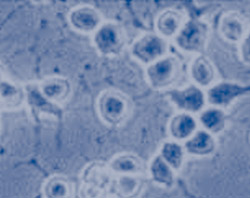|
|
|
Stem Cell Transplants Arrest Decline in Multiple Sclerosis
|
|
 |
|
|
Stem cells
|
|
|
|
|
|
|
An encouraging experimental study indicates a possible new therapy for advanced cases of multiple sclerosis, a disease in which the body’s immune system attacks the coating around neurons in the brain and nerves. Over time, the nerve damage can lead to paralysis and degeneration of bodily function.
A radical technique developed by researchers at the Fred Hutchinson Cancer Research Center and the University of Washington stabilized the condition of most of the multiple sclerosis patients in a small pilot group. The treatment involves immune system suppression using radiation and chemotherapy, followed by blood stem cell transplantation.
“All the patients in the study were going downhill rapidly,” said Dr. George Kraft, professor of rehabilitation medicine, who presented the results at an American Academy of Neurology meeting in April 2002. “To stabilize their condition is an achievement.”
Stem cell transplantation is an offshoot of bone marrow transplantation, pioneered by UW and Fred Hutchinson Cancer Research Center scientists to treat blood cancers such as leukemia. The successful multiple sclerosis pilot study introduces the possibility of using a more intense form of the procedure to treat autoimmune diseases. Related pilot studies are under way, led by the principal investigator on the multiple sclerosis study, Dr. Richard Nash, associate professor of medicine and leader of the Fred Hutchinson Cancer Research Center transplant team. His group is using the same technique on systemic sclerosis and lupus. With no available cure for any autoimmune disease, stem cell transplants are being studied to determine their effectiveness in patients with extreme symptoms of certain autoimmune disorders.
In the early stages of multiple sclerosis, various drugs may slow the progression. UW participates in multicenter trials for a number of treatment studies for recently diagnosed patients.
“In the late stages of multiple sclerosis, however, until now nothing has worked,” said Dr. James Bowen, assistant professor of neurology and a co-investigator on the stem cell transplant study.
The experimental treatment begins with extraction of the small proportion of stem cells in the blood. An intricate filtering technique is used to extract stem cells, which are the germinal cells from which new blood cells derive. The next step is harrowing: Patients are given total body radiation, high-dose chemotherapy and antibodies to completely suppress their immune systems.
The research physicians then put back the patient’s own stem cells to reconstitute the immune system from scratch. The abnormal immunological programming that had led the system to attack the neuron coatings has been wiped clean. Although the nerves harmed earlier could not be repaired, those patients for whom the treatment is successful experienced no additional damage to their nerves.
Of 26 patients in the study, one died early in the trials, six had complications and continued to decline, and 19 stabilized.
A National Institutes of Health (NIH) sponsored, multicenter, randomized follow-up study with around 220 patients is planned to confirm the effectiveness of the treatment.
Immunosuppressive therapy using stem cell rescue, and other research to improve multiple sclerosis treatment, are among the philanthropic interests of such contributors as Samuel and Ardis Beard. The Beards made a gift, complete with corporate matching funding, to the UW’s Multiple Sclerosis Research Fund. Other contributors to multiple sclerosis research in the neurology, pathology and rehabilitation medicine departments include the Multiple Sclerosis Foundation, which continued to support rehabilitation and vocational counseling in 2001-2002.
|












